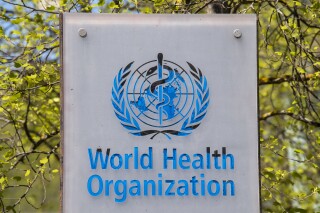Woman describing pandemic plans for a ‘soft coup’ is not a WHO representative

FILE - The logo and building of the World Health Organization (WHO) headquarters in Geneva, Switzerland, April 15, 2020. A video spreading on social media has been edited to make it appear as though a woman is speaking on behalf of WHO about the agency’s alleged plans for denying people their rights. (Martial Trezzini/Keystone via AP, file)
CLAIM: A video shows a World Health Organization representative discussing plans the agency is developing as a way to disregard human rights protections in the name of pandemic preparedness.
AP’S ASSESSMENT: False. The woman in the video does not work for WHO, nor was she speaking on its behalf, a spokesperson for the United Nations agency told The Associated Press. The spokesperson also confirmed that WHO is not developing any such plans to take away human rights, as described in the video.
THE FACTS: Social media users are sharing select footage from a May 2023 conference featuring multiple speakers known for spreading COVID-19 misinformation. The video is edited to make it appear the woman, whose credentials are not mentioned, is speaking on behalf of WHO at a press conference or a gathering of the entire European Parliament.
In the video, the woman sits in front of a blue backdrop that includes the European Parliament logo and the address of its website. She speaks of a “soft coup” that will allow for human rights, such as freedom of speech, to be disregarded in the name of pandemic preparedness. Among other alleged evidence, she claims that a WHO treaty is part of this plan.
“I’ve been so vocal about the plans from #WEF and #WHO the past few months, and this is why,” reads one tweet that re-posted the video. “They’ve now openly admitted, in the EU Parlement that they’ve been doing a ‘soft coup’ with our and other countries world wide.”
A popular Facebook post similarly implied that the woman in the video is affiliated with WHO.
“There’s no way she said this out loud bro,” it reads. “WTF AM I HEARING.” The post had received more than 11,000 reactions and more than 19,000 shares as of Friday.
The woman in the video, Meryl Nass, is a Maine doctor whose license was suspended in January 2022 for spreading misinformation about COVID-19. Margaret Harris, a WHO spokesperson, confirmed that Nass does not work for the agency and that she was not speaking on its behalf at the conference.
According to the conference’s website, it was created to give doctors, lawyers and other professionals worldwide an “uncensored and safe haven” to “discuss their experiences with COVID-19.” Speakers for the 2023 event included known spreaders of misinformation about the virus.
An agenda for the conference states that it was held in Brussels on May 3, 2023, in Room PHS 1A2 of the European Parliament. “PHS” stands for Paul-Henri Spaak Building. Five members of the European Parliament co-hosted the event, according to a poster advertising the conference. But speakers did not address the entirety of the European Parliament. Such gatherings, or plenary sessions, in Brussels are held in a room called the Hemicycle.
WHO has drafted a voluntary treaty, which has not yet been ratified, that lays out broad recommendations related to international cooperation on pandemic prevention, preparedness and response. The treaty, though legally binding, has no enforcement mechanisms and does not overrule any nations’ individual health or domestic policies, the AP has reported. It includes an entire section devoted to protecting human rights.
Asked whether WHO is planning what Nass describes in the video, Harris wrote in an email, “we certainly are not.”
Nass stood by her comments at the conference in a phone call with the AP.
___
This is part of AP’s effort to address widely shared misinformation, including work with outside companies and organizations to add factual context to misleading content that is circulating online. Learn more about fact-checking at AP.

